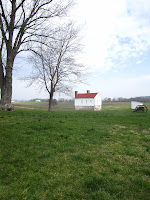 It is often called "The Battle That Saved Washington," and was one of the last the Confederates would carry out in Union territory. They have a great visitors center with a whole upper floor of very interesting exhibits. For the sake of time we instead focused on the auto tour. Jess put on some dramatic theme music and read from the brochure in a theatrical voice and really brought the battle to life.
It is often called "The Battle That Saved Washington," and was one of the last the Confederates would carry out in Union territory. They have a great visitors center with a whole upper floor of very interesting exhibits. For the sake of time we instead focused on the auto tour. Jess put on some dramatic theme music and read from the brochure in a theatrical voice and really brought the battle to life. 
At one point, I pulled into a parking area because I saw a trail off through the trees so I thought it was one of the tour stops. Next thing you know we're on some goat path into the woods and ended up having to cross a fallen tree to get to the trail I had spotted! We finally emerged onto a boardwalk that connected to a paved parking area that was the actual tour stop. Oops.
On September 18, 1862, during the Maryland Campaign, Confederate General Robert E. Lee's lost order No. 191 (which outlined his army's movements) was found on the Best Farm by soldiers from the 27th Indiana. This intelligence gave the Union a huge advantage. 


The Worthington House and yard were used as a field hospital. A Confederate artillery piece unlimbered in the front yard during the battle provided an amusing aside to the horrific fighting: every time the gun fired, the Worthington's rooster would crow!
The Thomas Farm was the scene of some of the heaviest fighting of the day. Caught between Union and Confederate lines, the house and outbuildings were captured and recaptured by both armies several times.
I loved reading the stories at these farms because it is just unfathomable to me thinking that one day you look out into your yard and see soldiers streaming across your fields. Next thing you know your home and land had been commandeered to be used in the fight. These people were there to witness battles and help in the aftermath and they didn't have much choice.



No comments:
Post a Comment